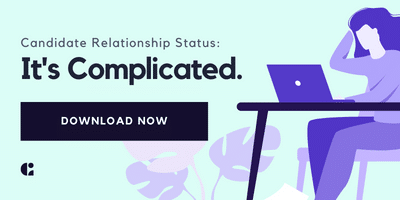There’s no better predictor of job success than a rock-solid interview.
What’s more, a well-executed interview is a critical factor for most candidates when deciding whether or not to accept a job offer — or hold out for a different one.
When interviews don’t go well, they can lead to poor hiring decisions, an abundance of avoidable legal troubles, a weak candidate experience, and even interviewer burnout.
The fact that nearly half of all hiring managers report never having been trained on how to conduct an interview tells us that something is broken. In a study by CareerBuilder, one in five interviewers said they feel rushed to make hiring decisions, despite being ill-equipped to do so. And with one in six job offers getting rejected these days, something’s gotta give.
As a talent acquisition leader, putting in the time and work to attract new members to your company in a competitive, candidate-driven market is tough — especially if you’re carrying most of the interview logistics load on your own.
But with an amazing interviewer training program, you can lighten the load for yourself as well as any other interviewers on your team. Great interviews generate higher offer acceptance rates, level up the quality of your hiring decisions, and create a stronger candidate experience — all in a way that’s both successful and scalable. And great interviews start with amazing training. Here are four ways to get started.
Predetermine job competencies
Interviewers should never walk into an interview without knowing exactly what they’re looking for first.
Armed with a vision for what success looks like in the role they’re trying to fill, interviewers can then turn their attention to evaluating their interviewees fairly and effectively. But without a picture of the ideal candidate, interviewers risk making decisions that are bad or biased — or worse, both.
As a hiring leader, you can set your entire interview team up for success by providing hiring criteria tied directly to job-specific skills and competencies, helping interviewers to avoid decisions based on the personal, demographic, or lifestyle chatter that often comes up during ad hoc interviews.
To get started, ask yourself these questions:
- Are there any professional certifications or knowledge requirements that are critical to the job?
- Are there any technical skills required for the new hire to have that can’t be trained on the job?
- Which soft skills will make a candidate successful in this role? (Think communication skills, time management, ability to work independently, problem-solving, ability to manage a team, etc.)
Then, create templates for your interview team, and store them in an easily accessible place, like a shared drive.
Everyone benefits from interview preparation: the company, the candidates, and the interviewers.
Mitigate implicit biases and illegal practices
Even with the utmost preparation, interviews can still go off the rails when an interviewer inadvertently asks illegal questions, or makes inappropriate comments.
Assuming that the interviewers already know which interview questions are “right” and “wrong” is the first mistake many hiring leaders make when it comes to legal compliance. To prevent discriminatory interview practices — whether intentional or not — TA leaders should educate their team about current hiring laws.
So after carefully pre-selecting the job-specific criteria for each role, try creating an up-to-date list of questions and topics to avoid during interviews, including anything related to a candidate’s age, race, ethnicity, ability, gender, sexual orientation, religion, relationship status, or personal finances.
For example, instead of asking about the candidate’s country of origin, cue interviewers to ask if the interviewee is eligible to work in the country where the job duties need to be performed. In lieu of asking if their religion would keep them from working on weekends or certain holidays, explain any scheduling requirements for the position, and ask if there are conflicts with their availability. And instead of asking candidates if they have any disabilities, ask if they’re capable of performing any physical demands of the job at hand.
With training on how to stick to appropriate topics, hiring leaders and interviews can both feel confident about their interactions with candidates.
Leverage technology
While legal compliance is critical, there’s more to an amazing interview than just following the rules. By employing technology to support the administrative parts of an interview, hiring leaders can empower interviewers to increase the quality and fairness of their interviews even further.
When interviewers get bogged down with back-and-forth scheduling and rescheduling, manually updating the hiring status of each candidate, and managing interviews across various time zones, they have less capacity to focus on more important things. But when technology takes care of the tedious tasks, interviewers are freed up for more valuable work, like building rapport with candidates.
In addition to increasing candidate engagement, technology can also be leveraged to put together diverse interview panels, which boosts candidate satisfaction even more. When candidates see themselves represented on an interview panel, and trust they’ll truly be included on their new prospective team, they’re far more likely to continue through to the end of the hiring process.
What’s more, by representing individuals from a variety of different groups and backgrounds, diverse interview panels lend themselves to higher quality hiring decisions because of the diversity of the interviewer feedback collected. Only then can your team stop making hiring decisions based solely on interviewer intuition, and start making more based on objective, quality interview data.
Focus on candidate engagement
In a candidate-driven market like this one, hiring leaders should assume that job seekers are interviewing with multiple companies; and when that’s the reality, the engagement a candidate gets from your team could be just the advantage you need.
A focus on continuous candidate engagement will give you:
- Faster turnaround on hiring decisions
- More high-quality talent in your pipeline
- A higher number of engaged candidates
- A larger pool of more diverse candidates
- More candidates that turn into customers
To level up your candidate engagement, train interviewers to treat your candidates like your customers by giving them the power to self-schedule their interviews, and giving them plenty of quality feedback throughout the hiring process—even if they don’t get the job.
While candidates who don’t win the job may be disappointed, nothing is worse than waiting too long to find out. Not only does hanging in limbo directly affect the candidate experience, but it also damages the employer brand.
On the flip side, hiring teams who reject candidates quickly will seriously lessen the pain of rejection, leading to better quality hires and a still-in-tact brand reputation.
Takeaways
Remember, more than just a way for companies to sift through potential employees, interviews serve as a way for candidates to get to know possible employers, too. When that interview comes across as hasty or chaotic, a previously inspired and eager candidate can become quickly disillusioned.
But when the interview is friendly and frictionless, candidates and hiring teams alike can look forward to effective, efficient hiring experiences.
Train interviewers on how to create an amazing interview experience, then teach them to trust the process.
Candidate Relationship Status: It’s Complicated
The concept of the candidate experience has changed. It’s time to focus on the candidate relationship. Yes—candidates want their job search to be positive and stress-free. But in this competitive market, top candidates desire much more than just an interview.
In Goodtime’s latest eBook you’ll learn how authentic connections are more valuable than ever when building a candidate relationship; transparency and open communication has become a key differentiator for employers, and why DEI is a top priority for candidates, as they search for companies to work for who represent people from all backgrounds. Download your free copy of the eBook below!

